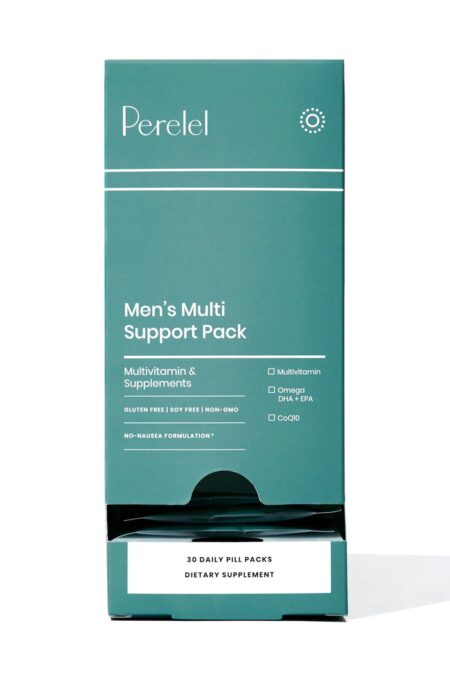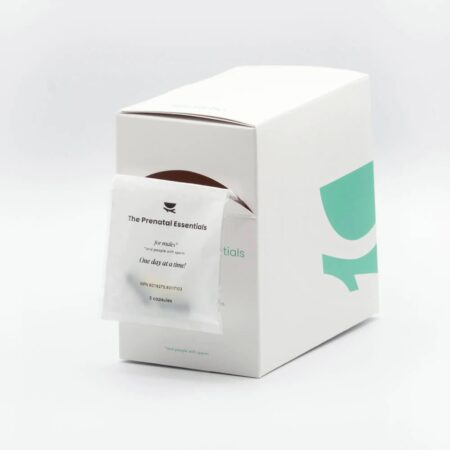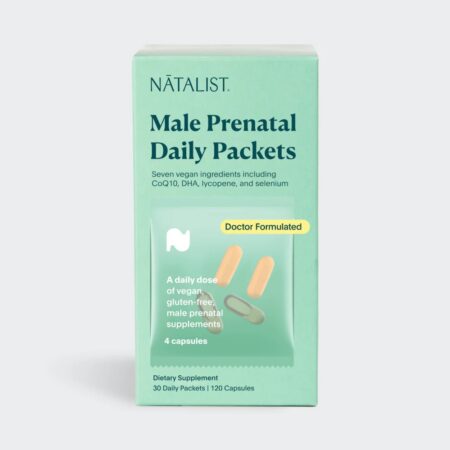The top 5 male fertility supplements (plus when to start taking them)
It takes two to make a baby. Here's why men's prenatal supplements are helpful.

Kristen Curette & Daemaine Hines/Stocksy
We independently select and share the products we love—and may receive a commission if you choose to buy.
Baby-making takes both sperm and an egg, but most preconception and prenatal nutrition advice surrounds female fertility. Sperm health, including shape, size and ability to swim to meet the egg, are all important indicators of male fertility. And guess what? Nutrition can directly impact all of them.
Prenatal supplements are non-negotiable and recommended for any woman who could become pregnant. But what about men and people with sperm? With more recognition of the importance of reproductive health for both partners, the number of products supporting male fertility on the market continues to grow.
Here’s what to know about prenatal vitamins for sperm health and our picks for the best male fertility supplements, so you can get your conception journey off to the right start.
Does your partner need a preconception vitamin?
Not everyone needs male preconception vitamins, but they can be helpful. Just like multivitamins can fill nutritional gaps, preconception male fertility vitamins are specifically formulated to provide essential nutrients that may be missing from the diet.
These supplements contain nutrients that can positively affect sperm count, motility (how well sperm move), morphology (shape of sperm), and DNA—all factors that impact a couple’s ability to conceive.
Certain nutrients in male prenatal supplements may also be higher than what’s typically found in someone’s diet. Supplement companies do this purposely to match dosages found beneficial in research. For example, vitamin B12 (found in animal products like meat, chicken, dairy, and fish) is often higher because it can help keep homocysteine in check. Homocysteine is a type of amino acid linked to male infertility.
You and your partner may take a closer look at your respective diets to decide if male preconception supplements are right for you. Still, some people choose to take them as an insurance policy.
When’s the best time to start taking male fertility supplements?
Some couples wait and decide to take a male preconception supplement if it takes longer to become pregnant. But if you do wait, it’s helpful to know that it can take time for male fertility supplements to work.
Sperm take two to three months to mature, so male preconception supplements should be taken for at least three months before trying to conceive to see the full benefits.
One thing to note: if you are concerned about fertility or sperm health, it’s a good idea to check in with your doctor. They may want to run tests and can help you decide if fertility supplements are right for you.
What to look for in the best men’s prenatal vitamins
As a general rule, you want to ensure your supplement is third-party tested, manufactured in a facility that meets the current good manufacturing practices (cGMP) guidelines, and comes from a reputable company. Some companies also emphasize sustainability practices and transparency about how their product is manufactured and where it comes from, which is a big plus.
But beyond these basics, male preconception supplements should also have key fertility-focused ingredients like antioxidants that protect the delicate cell membranes and fight against free radical damage. Or nutrients like omega-3 fatty acids, folic acid, and vitamin D to support sperm quantity and quality.
Many prenatal companies include background information on their website about their ingredients and why they contain specific nutrients so you can also learn more about what the research says.
Here are our 5 favorite male fertility supplements
These five male prenatal picks all get high marks for both quality and formulation. Here’s what made the cut.
Sources
Aitken RJ, Flanagan HM, Connaughton H, Whiting S, Hedges A, Baker MA. Involvement of homocysteine, homocysteine thiolactone, and paraoxonase type 1 (PON‐1) in the etiology of defective human sperm function. Andrology. 2016 Mar;4(2):345-60.
Amann RP. The cycle of the seminiferous epithelium in humans: a need to revisit?. Journal of andrology. 2008 Sep 10;29(5):469-87.
Banihani SA. Vitamin B12 and Semen Quality. Biomolecules. 2017;7(2):42. Published 2017 Jun 9. doi:10.3390/biom7020042
de Angelis C, Galdiero M, Pivonello C, et al. The role of vitamin D in male fertility: A focus on the testis. Rev Endocr Metab Disord. 2017;18(3):285-305. doi:10.1007/s11154-017-9425-0
Falsig AL, Gleerup CS, Knudsen UB. The influence of omega-3 fatty acids on semen quality markers: a systematic PRISMA review. Andrology. 2019;7(6):794-803. doi:10.1111/andr.12649
Imamovic Kumalic S, Pinter B. Review of clinical trials on effects of oral antioxidants on basic semen and other parameters in idiopathic oligoasthenoteratozoospermia. Biomed Res Int. 2014;2014:426951. doi:10.1155/2014/426951
Turner KA, Rambhatla A, Schon S, et al. Male Infertility is a Women’s Health Issue-Research and Clinical Evaluation of Male Infertility Is Needed. Cells. 2020;9(4):990. Published 2020 Apr 16. doi:10.3390/cells9040990




